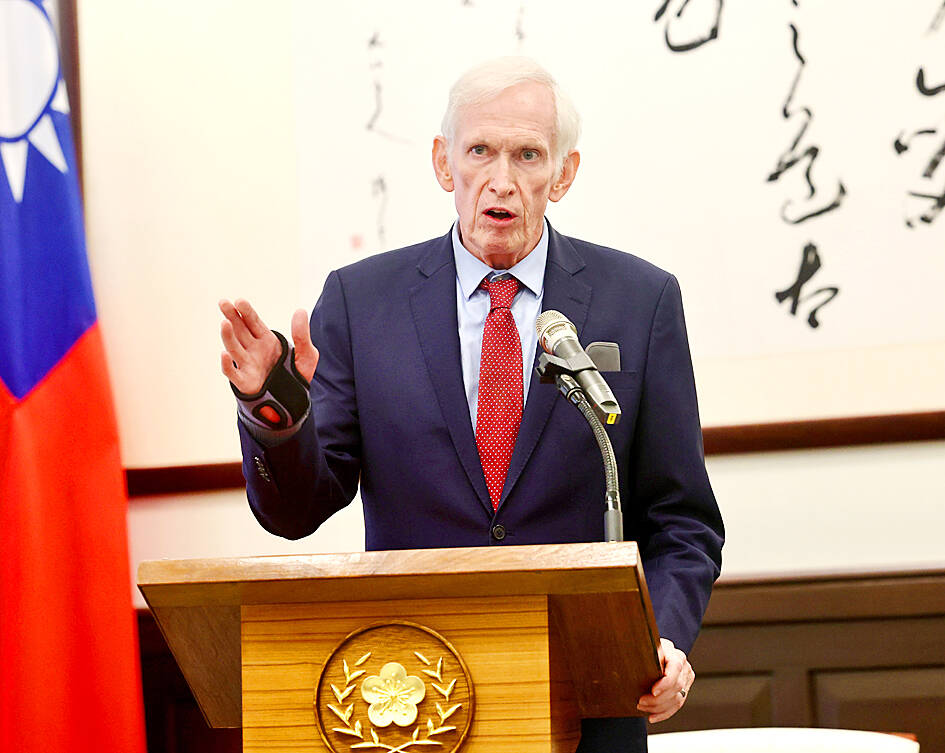President William Lai (賴清德) yesterday emphasized Taiwan’s determination to defend itself and cooperate with other democracies to handle global challenges, in a meeting with former American Institute in Taiwan (AIT) chairman James Moriarty.
The nation is to continue strengthening its defensive capabilities and show its resolve to defend itself and democracy, he was cited as saying by the Presidential Office in a statement.
Taiwan would also maintain its cooperation with the US and other like-minded nations in dealing with global challenges posed by pandemics and climate change, he said.

Photo: CNA
Lai thanked Moriarty for his support of the nation and contributions to its ties with the US, adding that he hoped the bilateral relationship would be strengthened to defend peace and stability in the Taiwan Strait.
The president welcomed Moriarty’s visit to Taiwan and said that the two have met multiple occasions during his tenures as Tainan mayor, premier and vice president.
Moriarty is counted as a personal friend and a good friend of Taiwan, who expanded the scope of bilateral relations and deepened their development, Lai said.
After departing from the AIT, Morarity continued his contributions to Taiwan by urging Washington to strengthen military cooperation between the two nations, he said.
Lai also thanked the US Congress for implementing the Taiwan Relations Act, the “six assurances” and other promises to Taiwan, which bolstered its defenses against authoritarian expansionism.
Moriarty said his personal feelings for Taiwan and commitment to keeping promises reflect the shared views of the US public.
Taiwan-US relations are based not only on common interests, but also on the two nations’ common values and principles, he said.
Peace and stability are the most important of Taipei and Washington’s mutual interests, Moriarty said, adding that the two must insulate their economies and societies from foreign interference.
Taiwan and the US face numerous internal and external challenges, but Moriarty said he was confident that cooperation and solidarity would continue to strengthen the alliance of democracies.
Moriarty thanked Lai and Taiwanese for his reception, their friendship with the US, and their support of democracy and other common values.
Separately, Minister of National Defense Wellington Koo (顧立雄) said the long-standing and constant view of the government is that war is best prevented by credible deterrence through strength.
He made the comments on the sidelines of a question-and-answer session at the legislature in Taipei, saying that Taiwan would continue working toward being part of the US Indo-Pacific strategy of systematic deterrence against Beijing’s adventurism.
The goal is to improve defensive capabilities to compel Chinese President Xi Jinping (習近平) to continually push back the timeline for taking over Taiwan, Koo said.
The US has done much to buttress security cooperation with allies including Japan and the Philippines, he said, adding that Taiwan’s strategically valuable location on the first island chain yields no alternative but to join the US-led security alliance.
Additional reporting by Lin Che-yuan

INVESTIGATION: The case is the latest instance of a DPP figure being implicated in an espionage network accused of allegedly leaking information to Chinese intelligence Democratic Progressive Party (DPP) member Ho Jen-chieh (何仁傑) was detained and held incommunicado yesterday on suspicion of spying for China during his tenure as assistant to then-minister of foreign affairs Joseph Wu (吳釗燮). The Taipei District Prosecutors’ Office said Ho was implicated during its investigation into alleged spying activities by former Presidential Office consultant Wu Shang-yu (吳尚雨). Prosecutors said there is reason to believe Ho breached the National Security Act (國家安全法) by leaking classified Ministry of Foreign Affairs information to Chinese intelligence. Following interrogation, prosecutors petitioned the Taipei District Court to detain Ho, citing concerns over potential collusion or tampering of evidence. The

‘FORM OF PROTEST’: The German Institute Taipei said it was ‘shocked’ to see Nazi symbolism used in connection with political aims as it condemned the incident Sung Chien-liang (宋建樑), who led efforts to recall Democratic Progressive Party (DPP) Legislator Lee Kun-cheng (李坤城), was released on bail of NT$80,000 yesterday amid an outcry over a Nazi armband he wore to questioning the night before. Sung arrived at the New Taipei City District Prosecutors’ Office for questioning in a recall petition forgery case on Tuesday night wearing a red armband bearing a swastika, carrying a copy of Adolf Hitler’s Mein Kampf and giving a Nazi salute. Sung left the building at 1:15am without the armband and apparently covering the book with a coat. This is a serious international scandal and Chinese

Seventy percent of middle and elementary schools now conduct English classes entirely in English, the Ministry of Education said, as it encourages schools nationwide to adopt this practice Minister of Education (MOE) Cheng Ying-yao (鄭英耀) is scheduled to present a report on the government’s bilingual education policy to the Legislative Yuan’s Education and Culture Committee today. The report would outline strategies aimed at expanding access to education, reducing regional disparities and improving talent cultivation. Implementation of bilingual education policies has varied across local governments, occasionally drawing public criticism. For example, some schools have required teachers of non-English subjects to pass English proficiency

TRADE: The premier pledged safeguards on ‘Made in Taiwan’ labeling, anti-dumping measures and stricter export controls to strengthen its position in trade talks Products labeled “made in Taiwan” must be genuinely made in Taiwan, Premier Cho Jung-tai (卓榮泰) said yesterday, vowing to enforce strict safeguards against “origin laundering” and initiate anti-dumping investigations to prevent China dumping its products in Taiwan. Cho made the remarks in a discussion session with representatives from industries in Kaohsiung. In response to the US government’s recent announcement of “reciprocal” tariffs on its trading partners, President William Lai (賴清德) and Cho last week began a series of consultations with industry leaders nationwide to gather feedback and address concerns. Taiwanese and US officials held a videoconference on Friday evening to discuss the